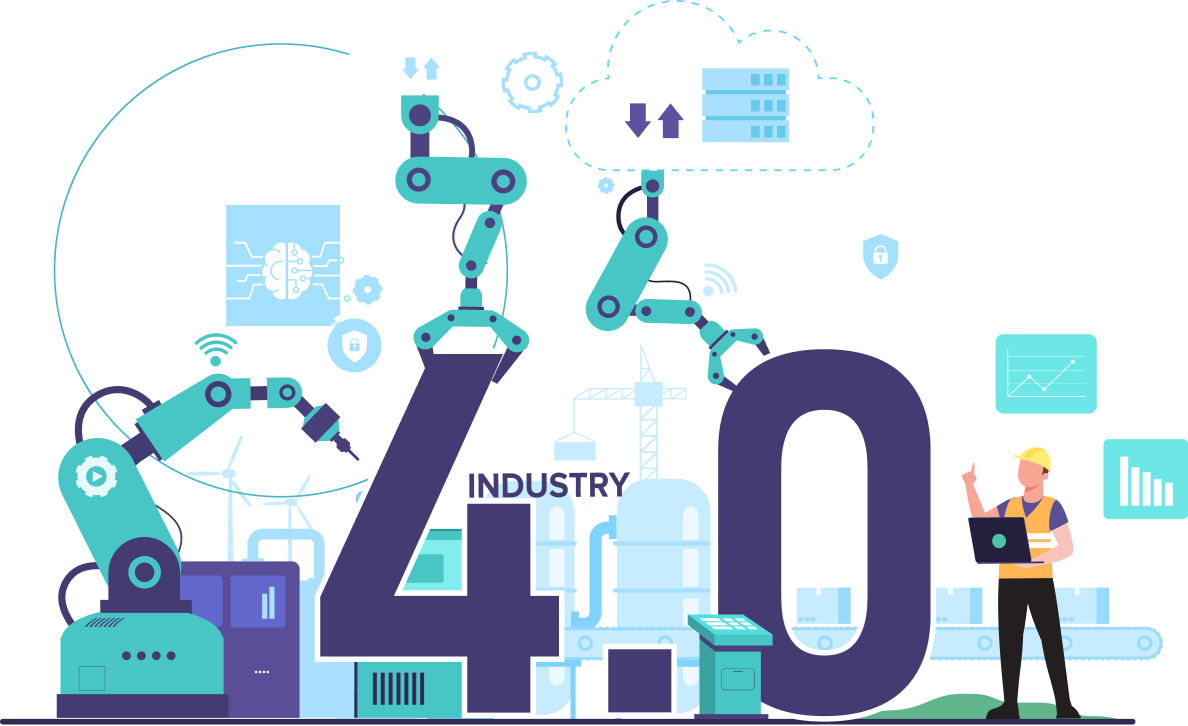An industrial revolution is happening right now.
How AI is revolutionizing the Manufacturing Industry.
Industrial revolution. Those are some powerful words. When I hear those words, I think of John D. Rockefeller and the incorporation of Standard Oil, modern monopoly, and industrialization. It also makes me think of 9th grade history class exams which may or may not haunt me to this day.
I digress. Did you know that the industrial revolution I mentioned above is only one out of four industrial revolutions that have happened to us? One is going on right now! The first one was in the late 1700s and it industrialized the manufacturing of textiles and began the move of production from homes to factories. Steam power was a new technology. The second was the one that comes to mind (my mind at least) being in the late 1800s with the introduction of build-out of railroads, large-scale iron and steel production, and widespread use of machinery in manufacturing. The third, which was around the 1970s, was around energy! Nuclear energy, electronics, telecommunications, and biotechnology were big in this time. Finally, the fourth industrial revolution is called “Industry 4.0”. This is happening right now, and the magnitude is still unknown.
Industry 4.0 is profound. Manufacturers are integrating new technologies, including Internet of Things (IoT), cloud computing and analytics, and AI and machine learning into their production facilities and throughout their operations.
I’d like to focus on how Industry 4.0 is impacting the Manufacturing Industry, specifically. Industry 4.0 has introduced perhaps the most impactful concept we’ve seen in Manufacturing in the past 50 years; and that is AI/ML. AI/ML is Artificial Intelligence and Machine Learning. According to an IBM survey, 34% of manufacturing companies have adopted some sort of AI/ML into their business. This is an increase from 14% just a year prior.
By now, we all pretty much understand what AI/ML is, but we may not comprehend the magnitude of it in the manufacturing industry. Some examples of AI/ML in manufacturing are automated data entry, predictive maintenance, supply chain inventory automation, and energy saving automation practices. How do they do it?
All AI/ML starts with data collection. Ingesting data into a central source and making sense of this data to train things like predictors or self-correcting robots. Unlocking pure data, that was impossible to aggregate before, to help expedite business. This is the core to almost all the outputs of AI/ML you might see in manufacturing today.
Let’s investigate predictive maintenance as an example of this. Prediction requires machine learning models based on large amounts of data for each component of the system. A predicted failure exists when the evaluation of the new data with the ML model indicates there is a statistical match with a piece of equipment in the system.
IoT devices, such as sensors on a forklift, can have its data gathered into a cloud storage solution (such as Amazon S3) and transformed into an organized data structure for proper machine learning. The machine learning can learn when data anomalies are happening, sometimes in real-time, and have AI tools (such as automated patching) perform predictive maintenance of those IoT devices! AWS has terrific solutions for this, see references below for more information.
As you can tell, the above solution can be complex but can also be customized to many different business cases. And this is just one type of AI/ML in manufacturing, I could go on and on with these examples. That’s why Industry 4.0 is so impactful, there’s endless innovations happening.
The important thing I want you to take away from this article is the growing data importance in manufacturing happening in Industry 4.0. Data ingestion, data transformations, data output, and action can be all under the umbrella of a “data lake”. In my next article, I’ll dive more into this with greater detail.
If you’re a manufacturing business owner, the one piece of advice I’d give you is to explore how Industry 4.0 can help you. Investigate what other companies are incorporating into their day-to-day business to allow them to go faster and more resilient. 3M has applied AI/ML to improve their process on their manufacturing of sandpaper (yes, sandpaper). Traditionally, 3M engineers would try to come up with ideal sandpaper by inspecting a CT scan for each sheet of paper to assess the number of grains on a sheet. Then, the engineer would test each sample against a rough surface to measure its effectiveness and try to correlate that effectiveness with the percentage of grains. As you can imagine, this process can be time consuming and error prone. Now, the team is automating image analysis with machine learning models that have been pre-trained for this use case, specifically. These machine learning models enable researchers to analyze how slight changes in shape, size, and orientation may improve abrasiveness and durability. In turn, those suggestions inform the manufacturing process.
Even simple AI/ML incorporations are helping manufacturing customer move more quickly. Cypag, an Italian manufacturing firm, has incorporated ebase.ai in their everyday process. ebase.ai is an email achieve knowledgebase that their sales employees use to ask questions, based on past customer engagements, to received technical answers (via past technical emails)in order to turn around information more quickly to their new customers. This processed alleviated the bottleneck they were experiencing with most real-time questions being directed toward their engineering team. Here AI/ML is using old email archives and repurposing them to assist new engagements.
Industrial revolution. Those words seem even more powerful now. It’s clear to say that Industry 4.0 can go toe-to-toe with any of the three other revolutions we’ve had in the past. So, before the next industrial revolution happens, make sure to improve with what’s being offered to you by Industry 4.0.
References:
Applications of artificial intelligence in intelligent manufacturing: a review
Bo-hu Li,
Bao-cun Hou,
Wen-tao Yu,
Xiao-bing Lu &
Chun-wei Yang
Frontiers of Information Technology & ElectronicEngineering volume 18, pages86–96 (2017)
https://www.ibm.com/topics/industry-4-0
https://www.ibm.com/blogs/internet-of-things/iot-manufacturing-ready/
https://aws.amazon.com/blogs/iot/using-aws-iot-for-predictive-maintenance/
https://aws.amazon.com/machine-learning/customers/3m/
